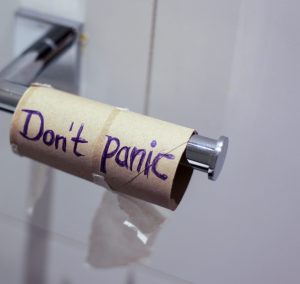On a recent talk the speaker asked her audience how many were “in survival mode.” One quarter of the hands went up.*
 I found this revelatory, not because 25% of people identified this way, but because I didn’t know there was any other way to live.
I found this revelatory, not because 25% of people identified this way, but because I didn’t know there was any other way to live.
I’m pretty sure I’ve lived my entire adult life in survival mode and I’ve never questioned it until now. This may have started when I was 14, when by counter intuition I survived a life-threatening situation. I don’t think I’ve ever recovered.
I think it’s possible that folks who live in this mode can be wildly out of touch with their objective situation. That is, that people who are objectively “rich” can feel like they are one paycheck away from ruin, and people who are terminally ill may not feel in danger at all.
I also believe people whose modus operandi defaults this way are more susceptible to mistrusting others, and that their behaviors are perplexing to people who don’t experience life like this. When I look closely at my own ‘survivalist’ mentality, I realize it’s a habit of thinking, not really ‘a thing,’ and that maybe it’s been more a hindrance than a help in my actual survival. I can attest it is definitely in the way of experiencing lighthearted happiness. So, here are my thoughts, in case they help you understand someone — or some situation — better.
What is survival mode?
- living as if you might die physically, financially, spiritually or emotionally at any moment
- assessing others for signs of being helpful to your survival, or harmful to your survival
- believing you can only focus on happiness, thriving, higher ideals or larger goals, once you’ve ensured your survival
- unfortunately, feeling like your survival is ensured is impossible when in this state, so a person may also be “stuck”
- if you are a parent, you may extend this mindset to include your dependents, and imagine looming threats around your entire sphere of protection
Who’s likely to experience it?
- anyone living in poverty, or who has lived in poverty
- any person or member of a group targeted in any way (POC, LGBTQTIA+, women, anyone victimized by a crime, etc.)
- anyone who focuses on protecting others: survival mode can also be a coping mechanism, or empathic reaction
What’s an indicator someone is in survival mode?
- PTSD, or signs of anxiety like jumpiness, tense breathing, fear of loud noises, etc.
- obsessive research, questions, or thinking in attempts to understand something
- mistrust of others, including benign acquaintances
- short temper, loss of humor, inability to understand sarcasm, overly literal thinking
- concern about little things, like ruminating on a store clerk’s frown
- hoarding of resources, fear of ends of things, focusing on death
- desire to flee – a fight or flight response
- addiction
 When is survival mode useful?
When is survival mode useful?
Perhaps it is at times helpful: if someone is facing a predatory individual who presents as benign, survival mode can focus awareness and maybe protect the person from harm.
When is it harmful?
People in this mode are not known for their pleasant manner, sociability, or trust, so relationships can suffer. Also, if the ‘survivalist’ is not employing critical thinking or seeking spiritual counsel, they may be prone to overly harsh judgements, or be easily swayed into assuming the worst. This may mean missing positive opportunities, or worse, becoming a conspiracy theorist, or violent.
What’s the way out? Should a person find a way out?
I think that folks who live this way are hard to be around, and likely to miss out on joys of life and pleasant surprises.
It’s almost like living with a grimace and squinty-eyes wherever you go: you look angry, yet can focus in on a single problem very well — maybe even solve it. But your peripheral vision is blocked from noticing things like a beautiful sky, fireflies or surprising allies.
You also cannot take a wider view of a situation literally or proverbially, which impairs your ability to leave it. Without a vision, it’s hard to know where to go.
 If one could leap out of survival mode using self-inquiry, how would it work?
If one could leap out of survival mode using self-inquiry, how would it work?
Question: how do you react, what happens around you, when you believe you are in danger?¹
Question: who would you be without this belief?¹
Question: if you employed your 5 senses and realized 1) you are alive, and 2) you are breathing right now, how would that be?
Question: will you try another mode for the rest of today?
* From a podcast on The Happiness Project, with Dr. Laurie Santos and Gretchen Rubin
¹ Inspired by ‘The Work’ of Byron Katie
modus operandi
